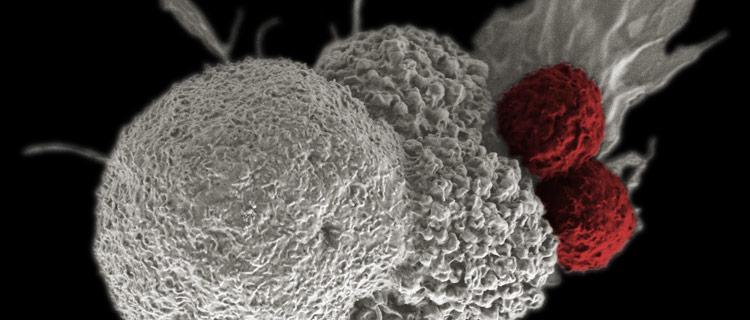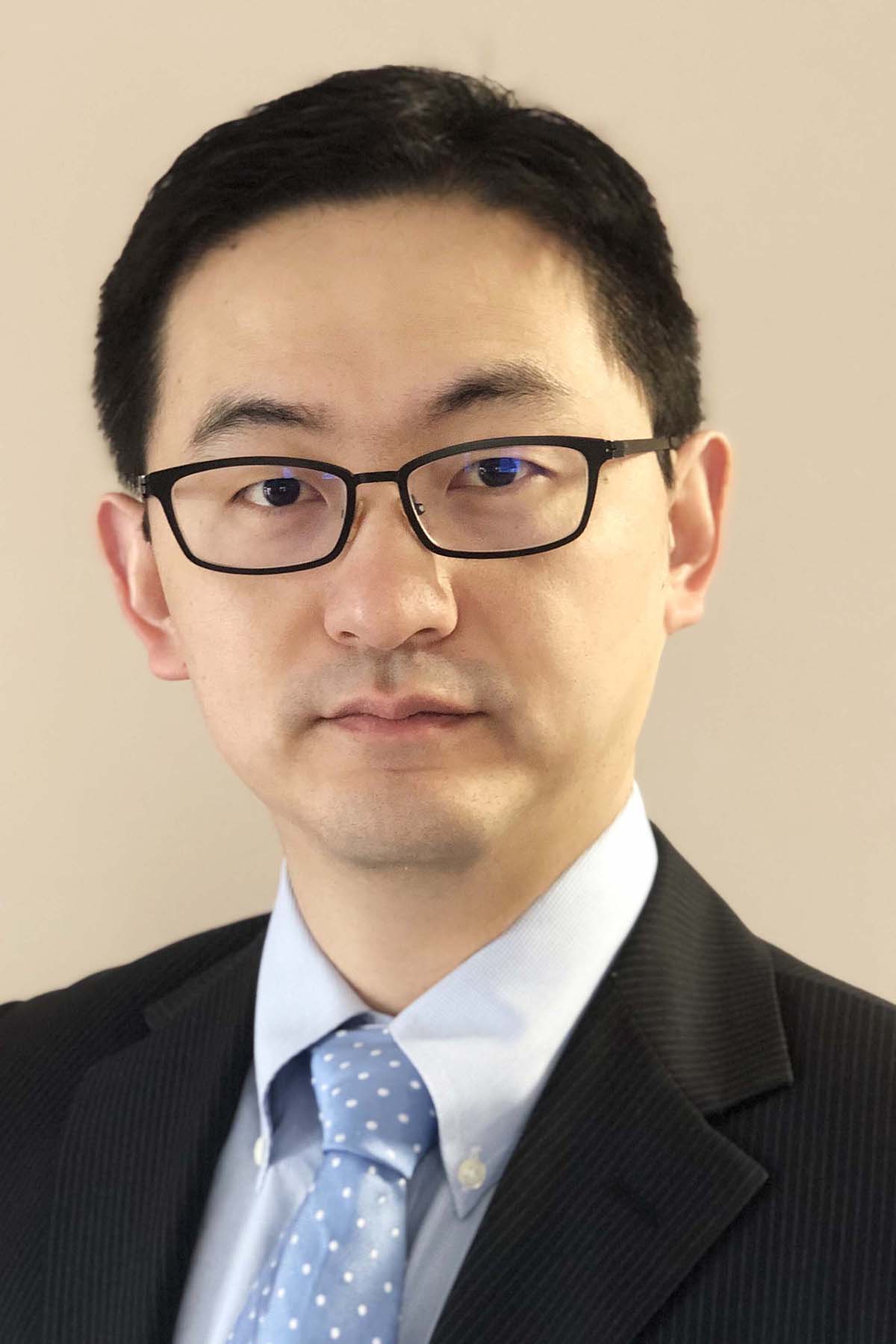   |
|
|
| |
|
| |
The goal of the Pelotonia Institute for Immuno-Oncology’s quarterly e-newsletter is to engage the Pelotonia and Immuno-Oncology community through inspiring stories and important updates on the key things we are doing to drive the next generation of cancer immunotherapies. To learn more about the institute, please visit cancer.osu.edu/piio. To contribute updates, please email Teresa Kutcher at Teresa.Kutcher@osumc.edu.
|
|
| |
|
director’s message
|
| |
The COVID-19 pandemic has created an unprecedented challenge for our global community. Around the world, health systems are nearing or exceeding inpatient capacity. The number of confirmed cases and casualties is sobering. Indeed, the crisis is changing the way we think, work and interact. In the days, months and years ahead, it is worth asking how we can become stronger in spite of these changes and challenges. In what ways can we become more innovative, collaborative and altruistic?
The crisis is real; however, I am seeing sparks of altruism, innovation and collaboration that are truly inspiring. Health care providers and staff are making great sacrifices for the sake of others. Researchers across different institutions are working hard on new vaccines and therapies. Biomedical informaticians are teaming up to mine big data and find answers faster. Charitable foundations are donating funds, supplies and time. There is an unprecedented sense of urgency and unity. My own laboratory just got approved to do cell therapy work for COVID-19. There can be no more silos—not for COVID-19, not for cancer, not for any disease that threatens our community.
I encourage each of you to remain hopeful. Practice physical distancing, not social distancing. Now is the time for us to unite, even if we must do so virtually.
Stay safe,
Zihai
Zihai Li, MD, PhD
Klotz Memorial Chair in Cancer Research
Professor and Founding Director
Pelotonia Institute for Immuno-Oncology
|
| |
|
new faculty
|
| |
The PIIO Welcomes Drs. Jerry Lio, Bei Liu and Gang Xin
 Chan-Wang (Jerry) Lio, PhD, will join the PIIO and MI&I as an assistant professor this summer. He is currently an instructor in the laboratory of Anjana Rao, PhD, at La Jolla Institute for Immunology, where he focuses on B-cell epigenetics. Dr. Lio will be an outstanding addition to our growing IO community and will add much-needed B-cell experience to the institute. Chan-Wang (Jerry) Lio, PhD, will join the PIIO and MI&I as an assistant professor this summer. He is currently an instructor in the laboratory of Anjana Rao, PhD, at La Jolla Institute for Immunology, where he focuses on B-cell epigenetics. Dr. Lio will be an outstanding addition to our growing IO community and will add much-needed B-cell experience to the institute.
 Bei Liu, MD, MPH, has become a professor in the Department of Internal Medicine, Division of Hematology. Dr. Liu comes to us from the Medical University of South Carolina and brings an NIH-funded research program focused on cancer immunotherapy, mucosal and tumor immunology, and innate immunity. She is interested in understanding chaperone biology in B cells, plasma cells and dendritic cells in both normal and pathological conditions. Her lab team discovered that the chaperone grp94 is required for multiple myeloma cell survival, which is mediated in part by the Wnt target survivin. They also discovered that grp94 critically regulates dendritic cell function in the tumor microenvironment. Bei Liu, MD, MPH, has become a professor in the Department of Internal Medicine, Division of Hematology. Dr. Liu comes to us from the Medical University of South Carolina and brings an NIH-funded research program focused on cancer immunotherapy, mucosal and tumor immunology, and innate immunity. She is interested in understanding chaperone biology in B cells, plasma cells and dendritic cells in both normal and pathological conditions. Her lab team discovered that the chaperone grp94 is required for multiple myeloma cell survival, which is mediated in part by the Wnt target survivin. They also discovered that grp94 critically regulates dendritic cell function in the tumor microenvironment.
 Gang Xin, PhD, was recruited as an assistant professor in MI&I and comes from Versiti Blood Center of Wisconsin. Dr. Xin investigates effector CD8 T cells and macrophages during viral infection and tumorigenesis. He has established a re-energized adoptive T-cell transfer platform (ReACT) that capitalizes on the synergistic effect of pathogen-based immunotherapy and adoptive T-cell therapy. Most recently, he identified a novel molecular mechanism that reveals how CD4 T cells help CD8 T-cell differentiation via BATF during chronic viral infection. This study, recently published in the journal Cell Reports, has made a significant impact on our understanding of molecular mechanisms that govern the differentiation, survival and function of virus-specific CD8 T cells. Gang Xin, PhD, was recruited as an assistant professor in MI&I and comes from Versiti Blood Center of Wisconsin. Dr. Xin investigates effector CD8 T cells and macrophages during viral infection and tumorigenesis. He has established a re-energized adoptive T-cell transfer platform (ReACT) that capitalizes on the synergistic effect of pathogen-based immunotherapy and adoptive T-cell therapy. Most recently, he identified a novel molecular mechanism that reveals how CD4 T cells help CD8 T-cell differentiation via BATF during chronic viral infection. This study, recently published in the journal Cell Reports, has made a significant impact on our understanding of molecular mechanisms that govern the differentiation, survival and function of virus-specific CD8 T cells.
We would like to the thank the Ohio State community and leaders, especially Eugene Oltz, PhD, and Yiping Yang, MD, PhD, for their recruitment assistance. Please join us in welcoming our four outstanding recruits to the PIIO! They strengthen their respective departments and the PIIO, supporting the institute’s vision of advancing immuno-oncology toward cancer cure.
|
| |
|
Updates: the Immune Monitoring & Discovery Platform (IMDP)
|
| |
The IMDP welcomes research assistants Kelsi Reynolds and Mohamed Yusuf. Reynolds has a bachelor’s degree in zoology from Ohio State. Her work experience includes serving as a clinical research assistant for the OSUCCC – James, interning at the Ohio Wildlife Hospital and working as a clinic assistant at Franklin Medical Center. Yusuf has a bachelor’s degree in biology from Ohio State. During his academic career, he was a research volunteer at the Ohio State Wexner Medical Center Outpatient Care East and served as treasurer of the Somali Students Association. The IMDP is recruiting additional technological staff as well as a lab manager. Updates on those recruitments are forthcoming.
The IMDP has been busy with the installations of the CyTOF, 10X Chromium Instrument and Isoplexis Isolight. We have also hosted training sessions for these instruments. In addition, the IMDP purchased a UV laser upgrade for our Cytek Aurora Flow Cytometer. This upgrade greatly increases the number of observable individual immune cell markers, allowing PIIO investigators to obtain more information from each patient and research sample. Ultimately, the additional marker observation will facilitate deeper insight into the immune system’s response to disease and therapy. These technologies will soon be added to the eRamp system and will be available to PIIO members and the broader medical center community. The IMDP continues to evaluate technologies to support our members’ needs for highly multiplexed tissue imaging. We are engaging with our industry counterparts to determine which platform will best serve our needs.
|
| |
|
PIIO Wins!
|
| |
One of two tissue factor-targeted technologies (third and fourth generations of tissue factor-targeted immunoconjugates) from the laboratory of Zihwei Hu, PhD, was licensed by the university to form a new startup company. Additionally, the Hu Lab published a paper on the proof-of-concept and efficacy of the other technology (TF-targeted CAR-NK/T cells and their uses). The paper is Tissue Factor as a New Target for CAR-NK Cell Immunotherapy of Triple-Negative Breast Cancer. Scientific Reports Volume 10 Issue 1 2020.
A new study led by PIIO researchers reveals a mechanism of cancer immune evasion that involves thrombin-mediated GARP cleavage and the release of TGFβ-1. These findings, reported in the journal Science Translational Medicine and featured in the breaking research news outlet ScienceDaily, suggest that blocking GARP cleavage could be an effective therapeutic strategy for overcoming cancer resistance to immunotherapy. (PMID: 31915300)
Several trainees received awards and honors this quarter:
- Rachel Brown (third-year MSTP BSGP student in the laboratory of Eugene Oltz, PhD, chair of the Department of Microbial Infection and Immunity [MI&I]) was selected for an oral presentation at the American Association of Immunologists (AAI) annual meeting (which has since been canceled). Her abstract is titled "CRISPR-Based Identification of Factors Influencing IL-22 and IL-17 Expression in Type III Innate Lymphoid Cells (ILCs)." She is studying chromatin and epigenetic regulation of cytokine expression in ILCs.
- Anqi Li (fourth-year BSGP student in the laboratory of Zihai Li, MD, PhD, Department of Internal Medicine, Division of Medical Oncology) was selected for an oral presentation at Immunology2020™ (which has since been canceled). Her abstract is titled “Targeting GARP-TGFβ Axis Enhances Antitumor Efficacy of Immune Checkpoint Blockade Therapy.” Overall, she aims to advance cancer immunotherapy by blocking TGFβ.
- Alessandra Metelli, PhD (former postdoc of Dr. Li and current collaborator), was selected for an oral presentation at the annual AAI meeting. Her abstract is titled “Thrombin Contributes to Cancer Immune Evasion via Proteolysis of Platelet-Bound GARP for LTGF-β Activation.” Dr. Metelli investigates the role of monocytes and macrophages in cancer immunotherapy in the laboratory of Carsten Krieg, PhD, assistant professor in the Department of Microbiology and Immunology, Hollings Cancer Center, Medical University of South Carolina.
- Kaitlin Read (second-year BSGP student in the laboratory of Ken Oestreich, PhD, MI&I) was selected for a block symposium oral presentation at Immunology2020™. Her abstract is titled “Eos Supports TH1 Differentiation Through Feed-Forward Propagation of the IL-2/STAT5 Signaling Pathway.” Read’s work focuses on molecular mechanisms that regulate T helper cell differentiation and function.
- Ankita Saini, PhD (postdoc in the Oltz lab) was awarded a two-year Pelotonia Postdoctoral Fellowship for her project titled "Defining IL22 Regulatory Logic in Type 3 Lymphoid Cells During Inflammation and Colon Cancer."
|
| |
|
publications
|
| |
NOTE: OSUCCC members are denoted in bold, and the abbreviations of their respective research programs are indicated in parentheses. The abbreviations for programs listed below are: LR (Leukemia Research), TT (Translational Therapeutics) CB (Cancer Biology) and CC (Cancer Control).
Trikha P, Lee DA (LR). The role of AhR in transcriptional regulation of immune cell development and function. Biochimica et Biophysica Acta (BBA) – Reviews on Cancer 2020 January;1873(1):188335. pubmed: 31816350
Woyach JA (LR), Blachly JS (LR), Rogers KA (LR), Bhat SA, Jianfar M, Lozanski G (LR), Weiss DM, Andersen BL (CC), Gulrajani M, Frigault MM, Hamdy A, Izumi R, Munugalavadla V, Quah C, Wang MH, Byrd JC (LR). Acalabrutinib plus obinutuzumab in treatment-naive and relapsed/refractory chronic lymphocytic leukemia. Cancer Discovery 2020 March;10(3):394-405. pubmed: 31915195
Metelli A, Wu BX, Riesenberg B, Guglietta S, Huck JD, Mills C, Li A, Rachidi S, Krieg C, Rubinstein MP, Gewirth DT, Sun S, Lilly MB, Wahlquist AH, Carbone DP (TT), Yang Y (LR), Liu B, Li Z (TT). Thrombin contributes to cancer immune evasion via proteolysis of platelet-bound GARP to activate LTGF-β. Science Translational Medicine 2020 Jan. 8;12:525. pubmed: 31915300
Tohme S, Sanin GD, Patel V, Bress K, Ahmed N, Krane A, Tsung A (TT), Steel JL. Health-related quality of life as a prognostic factor in patients after resection of hepatic malignancies. Journal of Surgical Research 2020 January;245:257-264. pubmed: 31421371
Bonneville R, Krook MA, Chen HZ, Smith A, Samorodnitsky E, Wing MR, Reeser JW, Roychowdhury S (TT). Detection of microsatellite instability biomarkers via next-generation sequencing. Methods in Molecular Biology 2020;2055:119-132. pubmed: 31502149
Mack MR, Brestoff JR, Berrien-EllioU MM, Trier AM, Yang TB, McCullen M, Collins PL, Niu H, Bodet ND, Wagner JA, Park E, Xu AZ, Wang F, Chibnall R, Council ML, Heffington C, Kreisel F, Margolis DJ, Sheinbein D, Lovato P, Vivier E, Cella M, Colonna M, Yokoyama WM, Oltz EM (CB), Fehniger TA, Kim BS. Blood natural killer cell deficiency reveals an immunotherapy strategy for atopic dermaLLs. Science Translational Medicine.2020 Feb. 26;12(532). pubmed:32102931
Purman CE, Collins PL, Porter SI, Saini A, Gupta H, Sleckman BP, Oltz EM (CB). Regional gene repression by DNA double-strand breaks in G1 phase cells. Molecular and Cellular Biology 2019 Nov. 25;39(24). pubmed:31591143
|
| |
|
research in progress meetings
|
| |
WebEx connection information will be included in the calendar invitation.
|
10-Apr
|
165 DHRLI
|
Roychowdhury Lab
|
|
17-Apr
|
159 DHRLI
|
Shindiapina Lab
|
|
24-Apr
|
165 DHRLI
|
Ansa-Addo Lab
|
|
1-May
|
165 DHRLI
|
Tridandapani Lab
|
|
8-May
|
165 DHRLI
|
Wu Lab
|
|
15-May
|
105 BRT
|
Y. Yang Lab
|
|
22-May
|
NA
|
Memorial Day weekend
|
|
29-May
|
165 DHRLI
|
Dubey Lab - Jessica Brown
|
|
5-Jun
|
105 BRT
|
Long Lab - Lingling Wang
|
|
12-Jun
|
165 DHRLI
|
Tsichlis Lab
|
|
19-Jun
|
105 BRT
|
Burd Lab - Aguilar-Valenzuela
|
|
26-Jun
|
165 DHRLI
|
O’Donnell Lab
|
|

|
| |
|
|
|